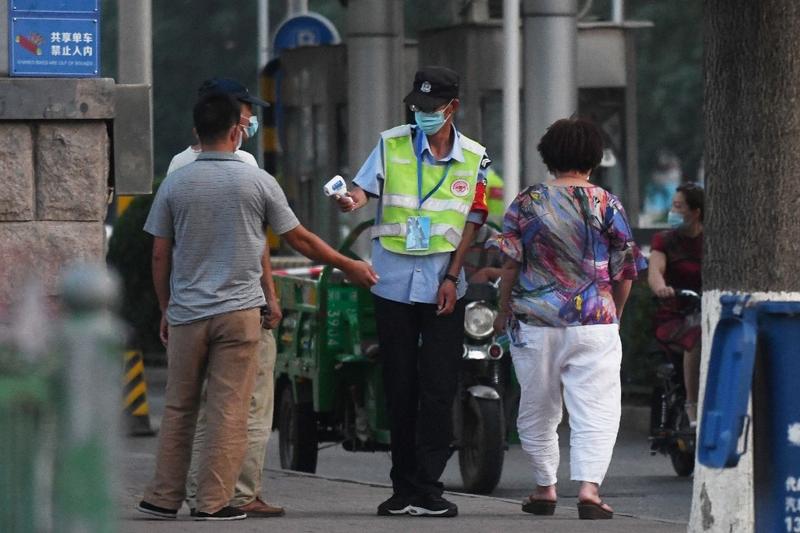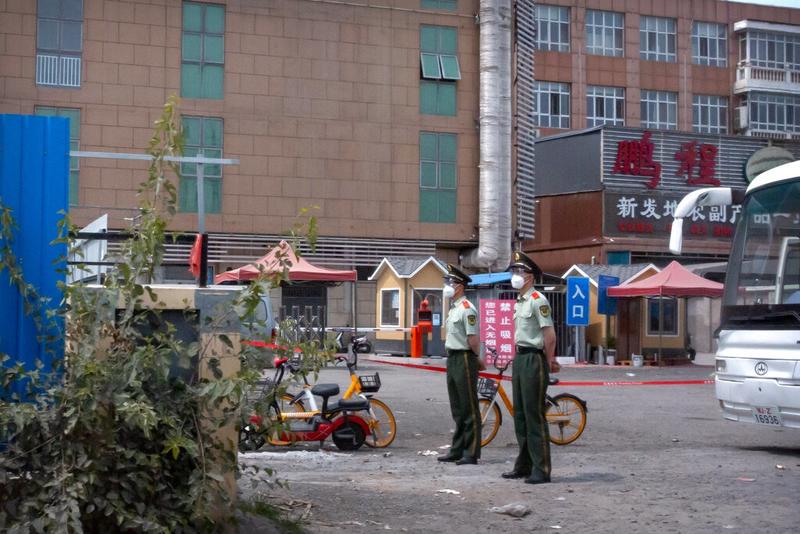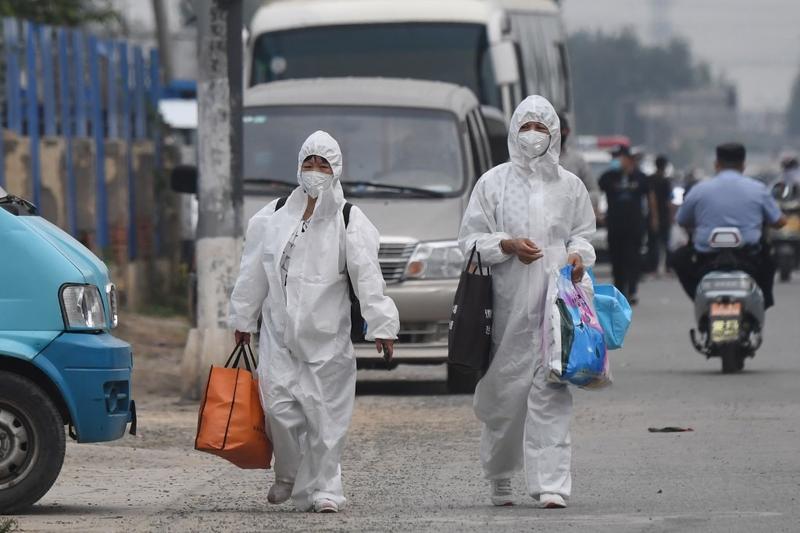 A worker takes the temperature of people walking outside the Xinfadi meat wholesale market in Beijing on June 12, 2020.
(GREG BAKER / AFP)
A worker takes the temperature of people walking outside the Xinfadi meat wholesale market in Beijing on June 12, 2020.
(GREG BAKER / AFP)
BEIJING - Xinfadi, the largest wholesale market with fruit, vegetable and meat supplies in Beijing, was closed on Saturday for disinfection after people working there and the surroundings tested positive for the novel coronavirus.
46 people tested positive in throat swab COVID-19 tests in Beijing, after authorities conducted city-wide nucleic acid tests in wholesale markets of farm produce and large-scale supermarkets on Friday
A total of 46 people tested positive in throat swab COVID-19 tests in Beijing, after authorities conducted city-wide nucleic acid tests in wholesale markets of farm produce and large-scale supermarkets on Friday, authorities said Saturday.
Disease prevention and control staff conducted nucleic acid tests on 1,940 people in the markets. Of the 517 samples collected from Xinfadi, 45 were found positive in throat swab tests, Pang Xinghuo, deputy director of the Beijing Center for Disease Prevention and Control, said at a press conference on Saturday.
Another positive test result was found in samples from a farm produce market in Beijing's Haidian district. It was a close contact of a confirmed COVID-19 case in Xinfadi.
All the 46 people have shown no symptoms, and they are under strict management and observation.
All personnel who had close contact with the market since May 30 will undergo nucleic acid testing, Gao Xiaojun, a spokesman with the Beijing Municipal Health Commission, told the press conference.
According to Gao, the city now has 98 qualified institutions for nucleic acid testing, with the daily testing capacity exceeding 90,000.
READ MORE: Beijing halts class resumption as 2 new cases confirmed
Covering a total area of 112 hectares, the Xinfadi market in Fengtai district has some 1,500 management personnel and more than 4,000 tenants.
Special sections have been set up for sales of vegetables and fruits with close-off management to ensure food supply to the district.
 Paramilitary police officers stand guard near the Xinfadi wholesale food market in Beijing, June 13, 2020. (MARK SCHIEFELBEIN / AP)
Paramilitary police officers stand guard near the Xinfadi wholesale food market in Beijing, June 13, 2020. (MARK SCHIEFELBEIN / AP)
Inbound cargo flights and imported freight will be closely watched and every effort will be made in the epidemiological investigation and source tracking related to the Xinfadi market, officials said in the press conference.
Chen Yankai, deputy head of the Beijing Municipal Bureau of Market Regulation, said the city will strengthen inspections of food markets with fresh products, frozen pork, beef, mutton and poultry as key products to be screened.
Supermarkets, convenience stores, food shops and venues providing food and drink services will also be primary targets of inspections, Chen said.
6 new local cases in Beijing
Four newly confirmed patients have visited the Xinfadi Wholesale Market of Agricultural Products in Fengtai District of Beijing
Beijing confirmed six new domestically transmitted COVID-19 cases on Friday, local authorities said Saturday.
Apart from the two confirmed cases who are both employees of the China Meat Food Research Center in Fengtai district and were reported earlier Friday, another four cases were newly reported between 4 pm and midnight Friday, according to a press conference held Saturday morning.
All of the four newly confirmed cases visited the Xinfadi market.
The first patient was a 38-year-old local man, who purchased goods at Xinfadi market on May 30, June 5 and June 6.
The second patient was a 50-year-old man from the city of Baoding, Hebei province. He worked as a driver and a purchasing agent in the seafood market of Xinfadi where he also lived.
The third patient was a 35-year-old man, also from Baoding. He worked as a vendor in the Xinfadi seafood market and also lived there.
The fourth patient was a 27-year-old woman from east China's Shandong province who ran her business in the Xinfadi wholesale market.
All the newly confirmed COVID-19 cases have been transferred to designated hospitals in the capital for treatment, according to Pang.
A total of 139 close contacts of the new cases in Fengtai district have been put under collective medical observation, according to the district government.
 Two people in protective suits walk on a street near the closed Xinfadi market in Beijing on June 13, 2020.
(GREG BAKER / AFP)
Two people in protective suits walk on a street near the closed Xinfadi market in Beijing on June 13, 2020.
(GREG BAKER / AFP)
Meanwhile, Beijing's centers for disease control and prevention at both the municipal and district level have organized tests in wholesale markets of farm products and large supermarkets throughout the city.
A total of 5,424 samples of seafood, meat and other food as well as samples from the external environment were collected for nucleic acid tests for COVID-19. Forty environmental samples from the Xinfadi wholesale market tested positive, while the samples from other wholesale markets of farm products and large supermarkets in the capital tested negative, according to Pang.
Students, teachers test negative
Students and teachers have tested negative in a Beijing primary school after the father of a fourth-grader was confirmed to be diagnosed with COVID-19, authorities said.
These people were on the same floor with the child of the patient in Yumin primary school, according to the Xicheng district government of Beijing.
Two close contacts tested negative in nucleic acid and antibody testing after the case was reported in on Thursday, including the student from the school.
ALSO READ: China shows best practices in virus battle, experts say
Beijing on Friday suspended the class resumption for primary schools' first to third graders after three new confirmed COVID-19 cases were reported in the capital city.
Higher-grade students who have returned to school will continue classes, and teaching arrangements will be adjusted according to the epidemic prevention and control situation in Beijing, according to the Beijing municipal commission of education.
Beijing's Municipal Sports Competitions Administration Center announced late Friday that all sports events will be suspended with immediate effect.
5 imported cases among 11 new
Apart from the six local cases in Beijing, five new imported COVID-19 cases were reported on the Chinese mainland Friday, the Chinese health authorities said Saturday.
Apart from the six local cases in Beijing, five new imported COVID-19 cases were reported on the Chinese mainland Friday, the National Health Commission said Saturday
No deaths related to the disease or new suspected cases were reported Friday, according to the National Health Commission in its daily report.
On Friday, two people were discharged from hospitals after recovery.
As of Friday, the overall confirmed cases on the mainland had reached 83,075, including 74 patients who were still being treated, with no one in severe condition.
Altogether 78,367 people had been discharged after recovery and 4,634 people had died of the disease, the commission said.
By Friday, the Chinese mainland had reported a total of 1,808 imported cases. Of the cases, 1,742 had been discharged from hospitals after recovery, and 66 remained hospitalized, with no one in severe condition. No deaths from the imported cases had been reported. There was currently one suspected case, the commission said.
According to the commission, 3,197 close contacts were still under medical observation after 635 people were discharged from medical observation Friday.
ALSO READ: Vaccine candidate shows promise
Also on Friday, seven new asymptomatic cases, including five from overseas, were reported on the mainland. A total of 13 asymptomatic cases were discharged from medical observation.
The commission said 98 asymptomatic cases, including 48 imported cases, were still under medical observation.
By Friday, 1,108 confirmed cases including four deaths had been reported in the Hong Kong Special Administrative Region (SAR), 45 confirmed cases in the Macao SAR, and 443 in Taiwan including seven deaths.
A total of 1,060 patients in the Hong Kong SAR, 45 in the Macao SAR, and 431 in Taiwan had been discharged from hospitals after recovery.


